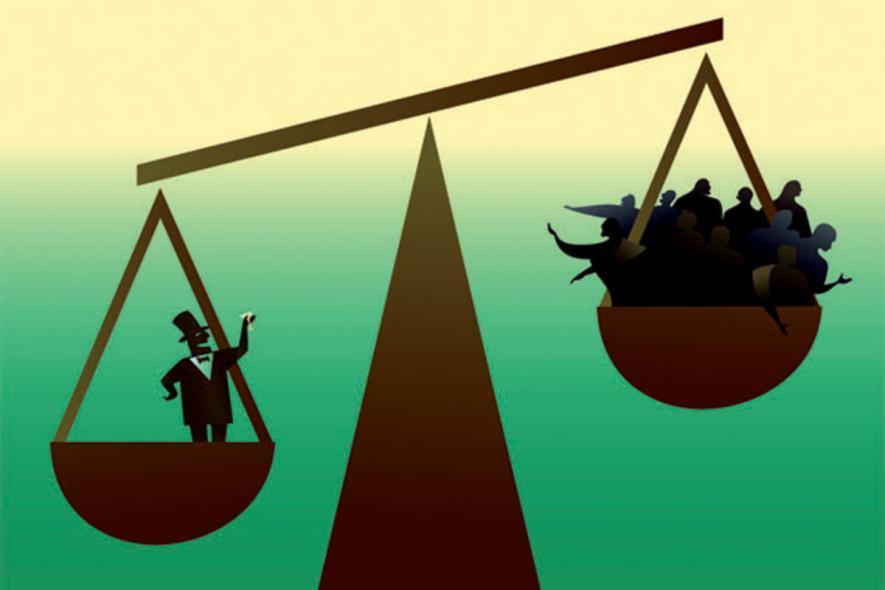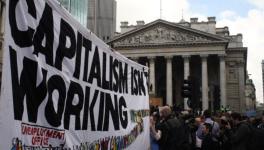Gandhi Anticipated Today’s ‘Billionaire Raj’

File Photo
The report “Income and Wealth Inequality in India 1922-2023: The Rise of Billionaire Raj” by Nitin Kumar Bharti, Lucas Chancel, Thomas Piketty, and Anmol Somanch, has revealed worrisome details concerning the massive levels of income and wealth inequalities among Indians and the domination of the super-rich with the top 1% holding 22.6% income and 40.1% wealth in 2022-23.
Such exponential inequalities, according to the report, are “among the very highest in the world” higher than even South Africa, Brazil and the US.
The usage of the phrase “The Rise of Billionaire Raj” in India after 77years of Independence indicates the burden of unacceptable levels of disparities caused by skewed distribution of income and wealth which has been accentuated during the Narendra Modi regime. It has put those possessing disproportionately more wealth and resources in a highly advantageous position to shape politics, economy, media narratives and many other vital sectors of our nation for perpetuating their dominance and remaining insensitive to the impoverishment of vast masses of people.
Gandhi Anticipated Billionaire Raj
It is quite instructive to note that the manifold intractable problems and challenges that India is facing by the rise of ‘Billionaire Raj’ was anticipated by Mahatma Gandhi more than 108 years ago in 1916.
While addressing the Muir College Economic Society, Allahabad, on December 22, 1916, Gandhi had very presciently said, “Indeed, the test of orderliness in a country is not the number of millionaires it owns, but the absence of starvation among its masses”. He said so in the context of his vision of a well-ordered society in which he affirmed, “the securing of one’s livelihood should be and is found to be the easiest thing in the world.”
India’s Low Rank in Global Hunger Index
Therefore, in India with the rise of ‘Billionaire Raj’, the poverty and hunger levels are rising and expanding and people are finding it exceedingly difficult to earn their livelihood. This is grimly demonstrated by India occupying the 111th position among 125 countries in the Global Hunger Index. This also indicates that progress to mitigate hunger has been almost stopped.
It is worth noting that the aforementioned report, while flagging ‘Billionaire Raj’, expressed serious concern by stating “…it “is unclear how long such inequality levels can sustain without major social and political upheaval.”
The inevitability of “major social and political upheaval” arising out of the high levels of inequality meant a state of persistent disorder in society, which Gandhi could foresee in 1916 with the rise of millionaires. Such a problem represents a gathering crisis, the magnitude of which can be ignored at our own peril.
Gandhi’s Warnings on Growing Economic Inequality
Gandhi, as stated above, while predicting that the absence of starvation and not number of millionaires in a society would indicate the state of orderliness in a society, had also underlined in early 1940s that the issue of economic inequality, unless addressed boldly, would spell ruination of society.
He wrote about it in his 1943 text “Constructive Programme”, which contained 18 points under captions such as “communal unity”, “removal of untouchability” and “village sanitation” and one point under the caption “economic equality” that dealt with concerns which have been highlighted in the recent report on ‘Billionaire Raj’. He described economic equality as the “master key to non-violent independence.”
Cautioning that “A nonviolent system of government is clearly an impossibility so-long as the wide gulf between the rich and the hungry millions persists,” he warned, “A violent and bloody revolution is a certainty one day unless there is a voluntary abdication of riches and the power that riches give and sharing them for the common good”.
Therefore, to prevent such a bloody outcome he stood for “…the levelling down of the few rich in whose hands is concentrated the bulk of the nation’s wealth on the one hand, and the levelling up of the semi-starved naked millions on the other.”
That vision of Gandhi has been embodied in the report on “Income and Wealth Inequality in India 1922-2023”. For instance, it pleads for restructuring the tax regime by imposing a “super tax of 2% on the net wealth of the 167 wealthiest families in 2022-23” so that it would yield 0.5% of national income in revenues and create valuable fiscal space to facilitate such investments which would lead to greater higher public investments in health, education and nutrition.
Dandi March Flagged Economic Inequality
The ‘Billionaire Raj’ report brought to public domain that the levels of inequalities in India are now worse than that of the British period.
As early as 1930, Gandhi before starting the famous Dandi March on March 12, that year wrote to Viceroy Lord Irwin outlining the massive income equality between him (the Viceroy) and an average Indian. He wrote that while the daily income of an average Indian was only 12 paise, the British Viceroy’s daily earning was Rs.700 and the corresponding figure for an average British subject and the Prime Minister of that country was Rs.2 and Rs.180, respectively.
Mahatma Gandhi mobilised public opinion around the issue that while the British Viceroy was getting much over 5,000 times India’s average income, the British Prime Minister was getting only 90 times of an average Briton's daily income. Therefore, he sensitised people of India about the meaning of independence, which he interpreted as deliverance from the killing weight of massive income disparities.
Therefore, Gandhi gave the idea of ‘trusteeship’ and wanted it to be implemented by legislation after mobilising public opinion in its favour. The idea of trusteeship essentially meant that those who own wealth, create wealth or have the knowledge to do so, can be trustees of that wealth. While allowing them to own some portion of that wealth, the rest of it should be used for society.
The Companies Act of 2013 mandatorily prescribing corporate social responsibility is a step in that direction. That Act prescribed that only profit-making companies could donate 7.5% of the average of three years of profit to political parties. The Modi regime removed that 7.5% ceiling by an amendment which allowed companies, regardless of profit or loss incurred by them, to donate unlimited amount under the Electoral Bond Scheme, which has now been held as unconstitutional by the Supreme Court. Such measures of the Modi regime exacerbated inequality levels in India.
Price of Inequality
Economist Joseph Stiglitz in his 2012 book, Price of Inequality, categorically asserted that growing economic inequality would erode accountability of the political regime to the people, deepen unfair practices, adversely impact on social cohesion and lead to class warfare. All those problems are now gripping India in an insidious manner. To address those problems measures must be taken to rid India of crony capitalism and Hindutva-corporate dominance.
The writer served as Officer on Special Duty to President of India K R Narayanan. The views are personal.
Get the latest reports & analysis with people's perspective on Protests, movements & deep analytical videos, discussions of the current affairs in your Telegram app. Subscribe to NewsClick's Telegram channel & get Real-Time updates on stories, as they get published on our website.























